2022年中考英语校园主题完形填空精讲(共有PPT25张)
文档属性
| 名称 | 2022年中考英语校园主题完形填空精讲(共有PPT25张) |

|
|
| 格式 | zip | ||
| 文件大小 | 482.3KB | ||
| 资源类型 | 教案 | ||
| 版本资源 | 通用版 | ||
| 科目 | 英语 | ||
| 更新时间 | 2022-01-20 18:01:08 | ||
图片预览

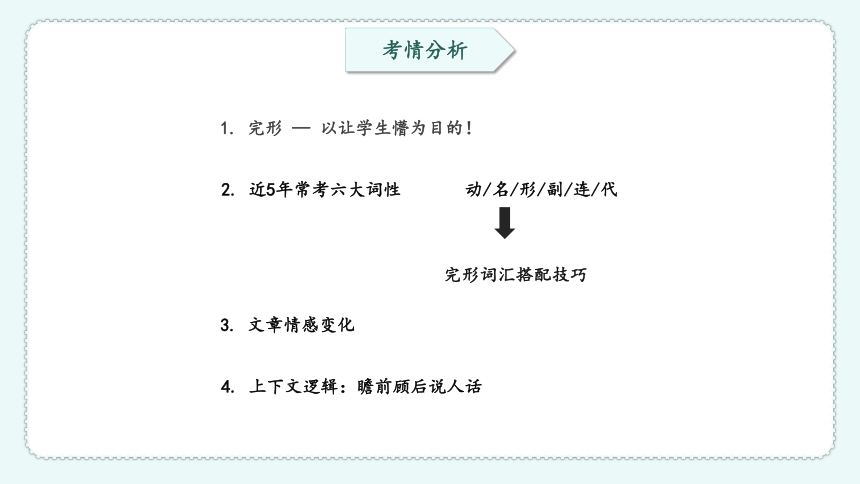

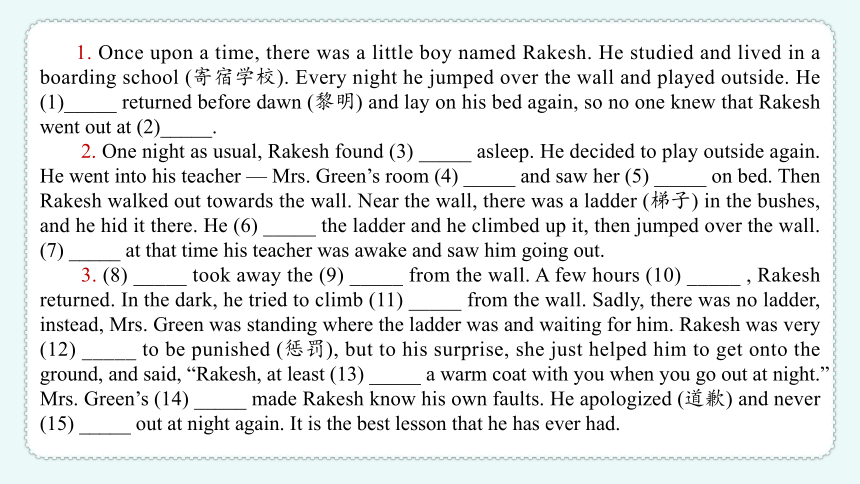
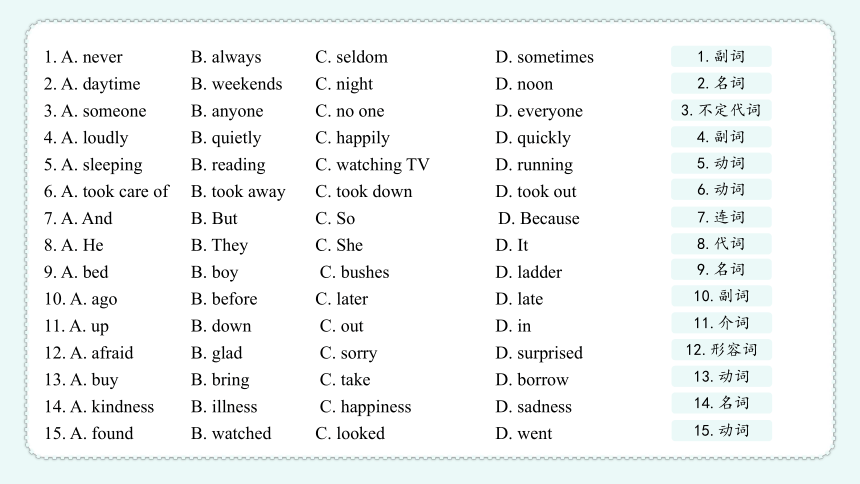
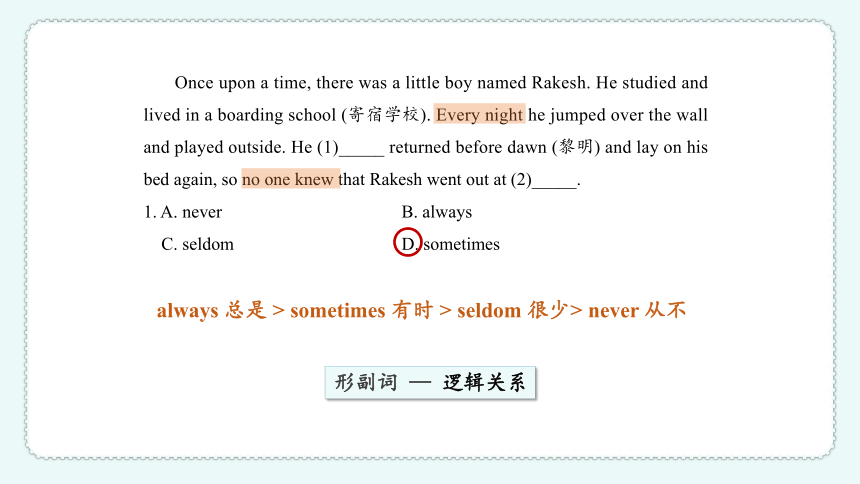
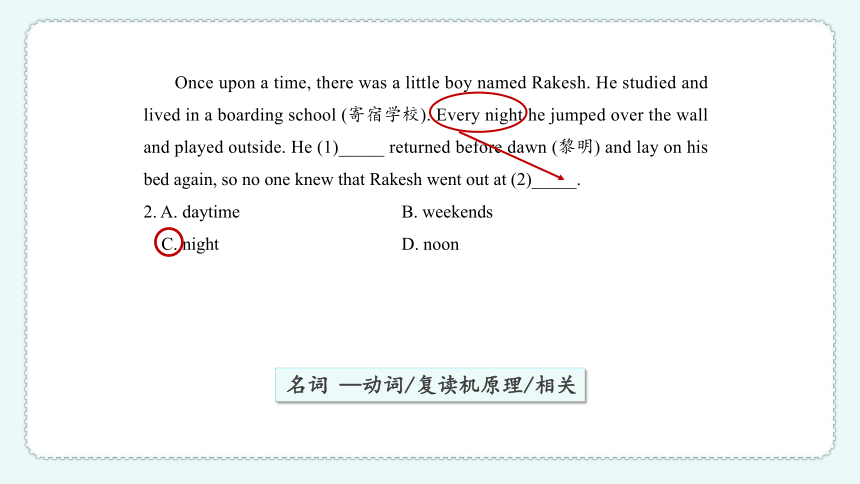
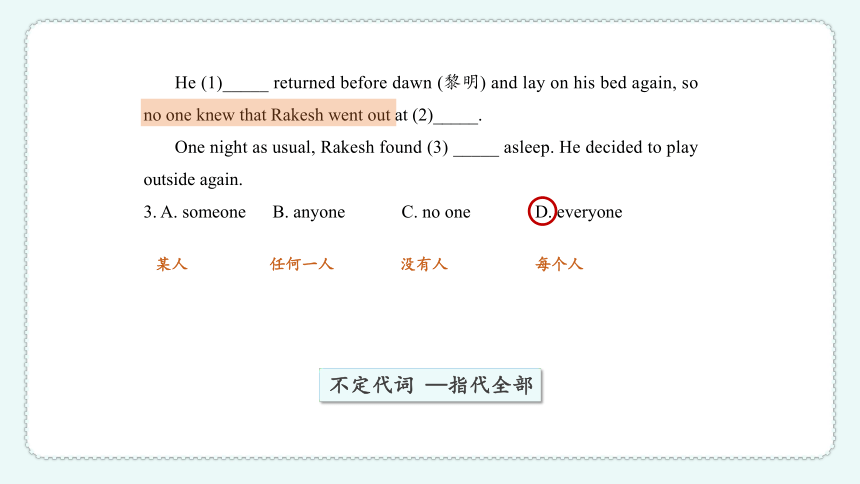

文档简介
(共25张PPT)
中考英语完形典例精讲
校园主题
1. 完形 — 以让学生懵为目的!
2. 近5年常考六大词性 动/名/形/副/连/代
完形词汇搭配技巧
3. 文章情感变化
4. 上下文逻辑:瞻前顾后说人话
考情分析
动词 — 看主宾/相关
名词 —动词/复读机原理/相关
形副词 — 感彩/动名/复读机原理
连词 — 逻辑关系
代词 — 明确指代
解题技巧
1. Once upon a time, there was a little boy named Rakesh. He studied and lived in a boarding school (寄宿学校). Every night he jumped over the wall and played outside. He (1)_____ returned before dawn (黎明) and lay on his bed again, so no one knew that Rakesh went out at (2)_____.
2. One night as usual, Rakesh found (3) _____ asleep. He decided to play outside again. He went into his teacher — Mrs. Green’s room (4) _____ and saw her (5) _____ on bed. Then Rakesh walked out towards the wall. Near the wall, there was a ladder (梯子) in the bushes, and he hid it there. He (6) _____ the ladder and he climbed up it, then jumped over the wall. (7) _____ at that time his teacher was awake and saw him going out.
3. (8) _____ took away the (9) _____ from the wall. A few hours (10) _____ , Rakesh returned. In the dark, he tried to climb (11) _____ from the wall. Sadly, there was no ladder, instead, Mrs. Green was standing where the ladder was and waiting for him. Rakesh was very (12) _____ to be punished (惩罚), but to his surprise, she just helped him to get onto the ground, and said, “Rakesh, at least (13) _____ a warm coat with you when you go out at night.” Mrs. Green’s (14) _____ made Rakesh know his own faults. He apologized (道歉) and never (15) _____ out at night again. It is the best lesson that he has ever had.
1. A. never B. always C. seldom D. sometimes
2. A. daytime B. weekends C. night D. noon
3. A. someone B. anyone C. no one D. everyone
4. A. loudly B. quietly C. happily D. quickly
5. A. sleeping B. reading C. watching TV D. running
6. A. took care of B. took away C. took down D. took out
7. A. And B. But C. So D. Because
8. A. He B. They C. She D. It
9. A. bed B. boy C. bushes D. ladder
10. A. ago B. before C. later D. late
11. A. up B. down C. out D. in
12. A. afraid B. glad C. sorry D. surprised
13. A. buy B. bring C. take D. borrow
14. A. kindness B. illness C. happiness D. sadness
15. A. found B. watched C. looked D. went
1.副词
2.名词
3.不定代词
4.副词
5.动词
6.动词
7.连词
8.代词
9.名词
10.副词
11.介词
12.形容词
13.动词
14.名词
15.动词
Once upon a time, there was a little boy named Rakesh. He studied and lived in a boarding school (寄宿学校). Every night he jumped over the wall and played outside. He (1)_____ returned before dawn (黎明) and lay on his bed again, so no one knew that Rakesh went out at (2)_____.
1. A. never B. always
C. seldom D. sometimes
always 总是 > sometimes 有时 > seldom 很少> never 从不
形副词 — 逻辑关系
Once upon a time, there was a little boy named Rakesh. He studied and lived in a boarding school (寄宿学校). Every night he jumped over the wall and played outside. He (1)_____ returned before dawn (黎明) and lay on his bed again, so no one knew that Rakesh went out at (2)_____.
2. A. daytime B. weekends
C. night D. noon
名词 —动词/复读机原理/相关
He (1)_____ returned before dawn (黎明) and lay on his bed again, so no one knew that Rakesh went out at (2)_____.
One night as usual, Rakesh found (3) _____ asleep. He decided to play outside again.
3. A. someone B. anyone C. no one D. everyone
不定代词 —指代全部
某人 任何一人 没有人 每个人
1. 意思不同:anyone 任何一人;everyone 每个人
2. anyone一般用于否定和疑问句;everyone常用于肯定句
I won’t tell anyone 你戴假发的事。
But everyone knows it. 你干嘛说那么大声。
anyone 与 everyone 的区别
One night as usual, Rakesh found (3) _____ asleep. He decided to play outside again. He went into his teacher — Mrs. Green’s room (4)_____ and saw her (5) _____ on bed.
4. A. loudly B. quietly C. happily D. quickly
大声地 安静地 开心地 快速地
形副词 — 感彩/动名
He went into his teacher — Mrs. Green’s room (4)_____ and saw her (5)_____ on bed. Then Rakesh walked out towards the wall. Near the wall, there was a ladder (梯子) in the bushes, and he hid it there. He (6)___ the ladder and he climbed up it, then jumped over the wall. (7)___ at that time his teacher was awake and saw him going out.
5. A. sleeping B. reading C. watching TV D. running
see sb. doing sth. 看到某人正在做某事
动词 — 看主宾/相关
Near the wall, there was a ladder (梯子) in the bushes, and he hid it there. He (6)_____ the ladder and he climbed up it, then jumped over the wall.
6. A. took care of B. took away C. took down D. took out
照顾 拿走 记下 取出
动词 — 动作先后
One night as usual, Rakesh found (3)___ asleep. He went into his teacher — Mrs. Green’s room (4)___ and saw her (5)___ on bed. Then Rakesh walked out towards the wall. Near the wall, there was a ladder (梯子) in the bushes, and he hid it there. He (6)___ the ladder and he climbed up it, then jumped over the wall. (7)___ at that time his teacher was awake and saw him going out.
7. A. And B. But C. So D. Because
连词 — 逻辑关系—转折
He went into his teacher — Mrs. Green’s room (4)___ and saw her (5)___ on bed…
(8) ___ took away the (9) ___ from the wall. A few hours (10) ___ , Rakesh returned. In the dark, he tried to climb (11) ___ from the wall.
8. A. He B. They C. She D. It
代词 — 明确指代
He (6)___ the ladder and he climbed up it, then jumped over the wall…
(8) ___ took away the (9) ___ from the wall. A few hours (10) ___ , Rakesh returned. In the dark, he tried to climb (11) ___ from the wall. Sadly, there was no ladder, instead, Mrs. Green was standing where the ladder was and waiting for him.
9. A. bed B. boy C. bushes D. ladder
名词 —复读机原理
(8) ___ took away the (9) ___ from the wall. A few hours (10) ___ , Rakesh returned. In the dark, he tried to climb (11) ___ from the wall. Sadly, there was no ladder, instead, Mrs. Green was standing where the ladder was and waiting for him.
10. A. ago B. before C. later D. late
以前 在……之前 之后 迟的
(8)___ took away the (9)___ from the wall. A few hours (10) ___, Rakesh returned. In the dark, he tried to climb (11)___ from the wall. Sadly, there was no ladder, instead, Mrs. Green was standing where the ladder was and waiting for him.
11. A. up B. down C. out D. in
向上 向下 外面 里面
climb down from 从……爬下来
Rakesh was very (12)___ to be punished (惩罚), but to his surprise, she just helped him to get onto the ground, and said, “Rakesh, at least (13)___ a warm coat with you when you go out at night.”
12. A. afraid B. glad C. sorry D. surprised
害怕的 高兴的 抱歉的 惊讶的
be afraid to do sth. 害怕做某事
形副词 — 感彩/动名
Rakesh was very (12)___ to be punished (惩罚), but to his surprise, she just helped him to get onto the ground, and said, “Rakesh, at least (13)___ a warm coat with you when you go out at night.”
13. A. buy B. bring C. take D. borrow
买 带来 拿着 向……借
take sth. with sb. 随身携带某物
动词 — 看主宾/相关
Rakesh was very (12)___ to be punished (惩罚), but to his surprise, she just helped him to get onto the ground, and said, “Rakesh, at least (13)___ a warm coat with you when you go out at night.” Mrs. Green’s (14)___ made Rakesh know his own faults. He apologized (道歉) and never (15)___ out at night again. It is the best lesson that he has ever had.
14. A. kindness B. illness C. happiness D. sadness
仁慈;宽容 疾病 开心 伤心
-ness 名词后缀
名词 —动词/复现/相关
Rakesh was very (12)___ to be punished (惩罚), but to his surprise, she just helped him to get onto the ground, and said, “Rakesh, at least (13)___ a warm coat with you when you go out at night.” Mrs. Green’s (14)___ made Rakesh know his own faults. He apologized (道歉) and never (15)___ out at night again. It is the best lesson that he has ever had.
15. A. found B. watched C. looked D. went
发现 观看 看 去
find out 发现; watch out 小心 ; look out 注意 ; go out 外出
动词 — 看主宾/相关/复读机原理
巩固提升
Why do children go to school You may (1)____ they go to learn languages, PE, history, science and other (2)____ . But why do they learn these things
We send our children to school to (3)____ for the time when they will grow up and begin to work for (4)____ . Nearly everything they study at school is useful in their life. But is that the (5)____ reason why they go to school
There is more in education (教育) than just learning facts. We go to school to learn (6)____ to learn. In this way, when we (7)____ school, we can still go on learning. If a man really knows how to learn, he will always be successful. When he has to do something (8)____ , he will teach himself how to do it in the best way. If the person doesn’t go to school, he may do it (9)____ . So, we go to school not to learn languages, math, geography, etc., but to learn the (10)____ to learn.
巩固提升
1. A. speak B. tell C. say D. talk
2. A. stories B. subjects C. sports D. news
3. A. get ready B. wait C. help D. give
4. A. their B. they C. us D. themselves
5. A. only B. last C. first D. one
6. A. what B. how C. why D. when
7. A. go to B. graduate C. leave D. come
8. A. interesting B. exciting C. old D. new
9. A. terrible B. terribly C. nice D. well
10. A. road B. reason C. way D. fact
参考答案
C
B
A
D
A
B
C
D
B
C
中考英语完形典例精讲
校园主题
1. 完形 — 以让学生懵为目的!
2. 近5年常考六大词性 动/名/形/副/连/代
完形词汇搭配技巧
3. 文章情感变化
4. 上下文逻辑:瞻前顾后说人话
考情分析
动词 — 看主宾/相关
名词 —动词/复读机原理/相关
形副词 — 感彩/动名/复读机原理
连词 — 逻辑关系
代词 — 明确指代
解题技巧
1. Once upon a time, there was a little boy named Rakesh. He studied and lived in a boarding school (寄宿学校). Every night he jumped over the wall and played outside. He (1)_____ returned before dawn (黎明) and lay on his bed again, so no one knew that Rakesh went out at (2)_____.
2. One night as usual, Rakesh found (3) _____ asleep. He decided to play outside again. He went into his teacher — Mrs. Green’s room (4) _____ and saw her (5) _____ on bed. Then Rakesh walked out towards the wall. Near the wall, there was a ladder (梯子) in the bushes, and he hid it there. He (6) _____ the ladder and he climbed up it, then jumped over the wall. (7) _____ at that time his teacher was awake and saw him going out.
3. (8) _____ took away the (9) _____ from the wall. A few hours (10) _____ , Rakesh returned. In the dark, he tried to climb (11) _____ from the wall. Sadly, there was no ladder, instead, Mrs. Green was standing where the ladder was and waiting for him. Rakesh was very (12) _____ to be punished (惩罚), but to his surprise, she just helped him to get onto the ground, and said, “Rakesh, at least (13) _____ a warm coat with you when you go out at night.” Mrs. Green’s (14) _____ made Rakesh know his own faults. He apologized (道歉) and never (15) _____ out at night again. It is the best lesson that he has ever had.
1. A. never B. always C. seldom D. sometimes
2. A. daytime B. weekends C. night D. noon
3. A. someone B. anyone C. no one D. everyone
4. A. loudly B. quietly C. happily D. quickly
5. A. sleeping B. reading C. watching TV D. running
6. A. took care of B. took away C. took down D. took out
7. A. And B. But C. So D. Because
8. A. He B. They C. She D. It
9. A. bed B. boy C. bushes D. ladder
10. A. ago B. before C. later D. late
11. A. up B. down C. out D. in
12. A. afraid B. glad C. sorry D. surprised
13. A. buy B. bring C. take D. borrow
14. A. kindness B. illness C. happiness D. sadness
15. A. found B. watched C. looked D. went
1.副词
2.名词
3.不定代词
4.副词
5.动词
6.动词
7.连词
8.代词
9.名词
10.副词
11.介词
12.形容词
13.动词
14.名词
15.动词
Once upon a time, there was a little boy named Rakesh. He studied and lived in a boarding school (寄宿学校). Every night he jumped over the wall and played outside. He (1)_____ returned before dawn (黎明) and lay on his bed again, so no one knew that Rakesh went out at (2)_____.
1. A. never B. always
C. seldom D. sometimes
always 总是 > sometimes 有时 > seldom 很少> never 从不
形副词 — 逻辑关系
Once upon a time, there was a little boy named Rakesh. He studied and lived in a boarding school (寄宿学校). Every night he jumped over the wall and played outside. He (1)_____ returned before dawn (黎明) and lay on his bed again, so no one knew that Rakesh went out at (2)_____.
2. A. daytime B. weekends
C. night D. noon
名词 —动词/复读机原理/相关
He (1)_____ returned before dawn (黎明) and lay on his bed again, so no one knew that Rakesh went out at (2)_____.
One night as usual, Rakesh found (3) _____ asleep. He decided to play outside again.
3. A. someone B. anyone C. no one D. everyone
不定代词 —指代全部
某人 任何一人 没有人 每个人
1. 意思不同:anyone 任何一人;everyone 每个人
2. anyone一般用于否定和疑问句;everyone常用于肯定句
I won’t tell anyone 你戴假发的事。
But everyone knows it. 你干嘛说那么大声。
anyone 与 everyone 的区别
One night as usual, Rakesh found (3) _____ asleep. He decided to play outside again. He went into his teacher — Mrs. Green’s room (4)_____ and saw her (5) _____ on bed.
4. A. loudly B. quietly C. happily D. quickly
大声地 安静地 开心地 快速地
形副词 — 感彩/动名
He went into his teacher — Mrs. Green’s room (4)_____ and saw her (5)_____ on bed. Then Rakesh walked out towards the wall. Near the wall, there was a ladder (梯子) in the bushes, and he hid it there. He (6)___ the ladder and he climbed up it, then jumped over the wall. (7)___ at that time his teacher was awake and saw him going out.
5. A. sleeping B. reading C. watching TV D. running
see sb. doing sth. 看到某人正在做某事
动词 — 看主宾/相关
Near the wall, there was a ladder (梯子) in the bushes, and he hid it there. He (6)_____ the ladder and he climbed up it, then jumped over the wall.
6. A. took care of B. took away C. took down D. took out
照顾 拿走 记下 取出
动词 — 动作先后
One night as usual, Rakesh found (3)___ asleep. He went into his teacher — Mrs. Green’s room (4)___ and saw her (5)___ on bed. Then Rakesh walked out towards the wall. Near the wall, there was a ladder (梯子) in the bushes, and he hid it there. He (6)___ the ladder and he climbed up it, then jumped over the wall. (7)___ at that time his teacher was awake and saw him going out.
7. A. And B. But C. So D. Because
连词 — 逻辑关系—转折
He went into his teacher — Mrs. Green’s room (4)___ and saw her (5)___ on bed…
(8) ___ took away the (9) ___ from the wall. A few hours (10) ___ , Rakesh returned. In the dark, he tried to climb (11) ___ from the wall.
8. A. He B. They C. She D. It
代词 — 明确指代
He (6)___ the ladder and he climbed up it, then jumped over the wall…
(8) ___ took away the (9) ___ from the wall. A few hours (10) ___ , Rakesh returned. In the dark, he tried to climb (11) ___ from the wall. Sadly, there was no ladder, instead, Mrs. Green was standing where the ladder was and waiting for him.
9. A. bed B. boy C. bushes D. ladder
名词 —复读机原理
(8) ___ took away the (9) ___ from the wall. A few hours (10) ___ , Rakesh returned. In the dark, he tried to climb (11) ___ from the wall. Sadly, there was no ladder, instead, Mrs. Green was standing where the ladder was and waiting for him.
10. A. ago B. before C. later D. late
以前 在……之前 之后 迟的
(8)___ took away the (9)___ from the wall. A few hours (10) ___, Rakesh returned. In the dark, he tried to climb (11)___ from the wall. Sadly, there was no ladder, instead, Mrs. Green was standing where the ladder was and waiting for him.
11. A. up B. down C. out D. in
向上 向下 外面 里面
climb down from 从……爬下来
Rakesh was very (12)___ to be punished (惩罚), but to his surprise, she just helped him to get onto the ground, and said, “Rakesh, at least (13)___ a warm coat with you when you go out at night.”
12. A. afraid B. glad C. sorry D. surprised
害怕的 高兴的 抱歉的 惊讶的
be afraid to do sth. 害怕做某事
形副词 — 感彩/动名
Rakesh was very (12)___ to be punished (惩罚), but to his surprise, she just helped him to get onto the ground, and said, “Rakesh, at least (13)___ a warm coat with you when you go out at night.”
13. A. buy B. bring C. take D. borrow
买 带来 拿着 向……借
take sth. with sb. 随身携带某物
动词 — 看主宾/相关
Rakesh was very (12)___ to be punished (惩罚), but to his surprise, she just helped him to get onto the ground, and said, “Rakesh, at least (13)___ a warm coat with you when you go out at night.” Mrs. Green’s (14)___ made Rakesh know his own faults. He apologized (道歉) and never (15)___ out at night again. It is the best lesson that he has ever had.
14. A. kindness B. illness C. happiness D. sadness
仁慈;宽容 疾病 开心 伤心
-ness 名词后缀
名词 —动词/复现/相关
Rakesh was very (12)___ to be punished (惩罚), but to his surprise, she just helped him to get onto the ground, and said, “Rakesh, at least (13)___ a warm coat with you when you go out at night.” Mrs. Green’s (14)___ made Rakesh know his own faults. He apologized (道歉) and never (15)___ out at night again. It is the best lesson that he has ever had.
15. A. found B. watched C. looked D. went
发现 观看 看 去
find out 发现; watch out 小心 ; look out 注意 ; go out 外出
动词 — 看主宾/相关/复读机原理
巩固提升
Why do children go to school You may (1)____ they go to learn languages, PE, history, science and other (2)____ . But why do they learn these things
We send our children to school to (3)____ for the time when they will grow up and begin to work for (4)____ . Nearly everything they study at school is useful in their life. But is that the (5)____ reason why they go to school
There is more in education (教育) than just learning facts. We go to school to learn (6)____ to learn. In this way, when we (7)____ school, we can still go on learning. If a man really knows how to learn, he will always be successful. When he has to do something (8)____ , he will teach himself how to do it in the best way. If the person doesn’t go to school, he may do it (9)____ . So, we go to school not to learn languages, math, geography, etc., but to learn the (10)____ to learn.
巩固提升
1. A. speak B. tell C. say D. talk
2. A. stories B. subjects C. sports D. news
3. A. get ready B. wait C. help D. give
4. A. their B. they C. us D. themselves
5. A. only B. last C. first D. one
6. A. what B. how C. why D. when
7. A. go to B. graduate C. leave D. come
8. A. interesting B. exciting C. old D. new
9. A. terrible B. terribly C. nice D. well
10. A. road B. reason C. way D. fact
参考答案
C
B
A
D
A
B
C
D
B
C
同课章节目录
- 词法
- 名词
- 动词和动词短语
- 动词语态
- 动词时态
- 助动词和情态动词
- 非谓语动词
- 冠词
- 代词
- 数词和量词
- 形容词副词及其比较等级
- 介词和介词短语
- 连词和感叹词
- 构词法
- 相似、相近词比较
- 句法
- 陈述句
- 一般疑问句和否定疑问句
- 特殊疑问句及选择疑问句
- 反意疑问句
- 存在句(There be句型)
- 宾语从句
- 定语从句
- 状语从句
- 主谓一致问题
- 简单句
- 并列句
- 复合句
- 主谓一致
- 主、表语从句
- 名词性从句
- 直接引语和间接引语
- 虚拟语气
- 感叹句
- 强调句
- 倒装句
- 祈使句
- 句子的成分
- 句子的分类
- 题型专区
- 单项选择部分
- 易错题
- 完形填空
- 阅读理解
- 词汇练习
- 听说训练
- 句型转换
- 补全对话
- 短文改错
- 翻译
- 书面表达
- 任务型阅读
- 语法填空
- 其他资料
